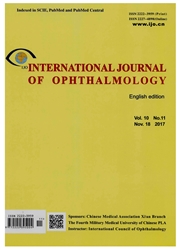

 中文摘要:
中文摘要:
目的观察以腹腔渗出细胞为饲养细胞对原代培养的成年大鼠视网膜Muller细胞生长状态的影响。方法制备大鼠腹腔渗出细胞,CD68免疫组织化学染色鉴定巨噬细胞,墨汁吞噬实验检测吞噬活性。酶消化法原代培养成年大鼠视网膜Muller细胞,神经胶质酸性蛋白(GFAP)和波形蛋白免疫组织化学染色鉴定。饲养细胞加入Muller细胞进行共培养后,流式细胞术分析Muller细胞的生长周期,末端脱氧核苷酸转移酶介导的dUTP缺口翻译法(TUNEL)染色检测凋亡情况。结果大鼠腹腔渗出细胞中巨噬细胞占95%以上,对墨汁颗粒有良好的吞噬能力。原代培养的Muller细胞贴壁生长,胞体较大、扁平,第3代细胞生长减慢。加入饲养细胞后,Muller细胞生长增生加快,S期和G2/M期细胞增多(S期,t=4.172,P〈0.001;G2/M期,t=3.562,P〈0.01),第1代细胞生长时间由25-30d缩短至18-22d,第2代由10-15d缩短至7-10d;Muller细胞凋亡减少(t=3.804,P〈0.01)。结论以腹腔渗出细胞为饲养细胞能促进Muller细胞的生长增生,抑制其凋亡,加快Muller细胞的培养速度,是原代培养成年大鼠视网膜Muller细胞的一种有效方法。
 英文摘要:
英文摘要:
Objective To investigate the effect of peritoneal exudative cells as feeder cells on growth state of primary culture of adult rat retinal Muller cells. Methods Peritoneal exudative cells were gained from adult rats, which were identified with specifically biological marker of macrophage (CD68). The phagocytosis was evaluated by the ink particles experiment. Retinal Muller cells of adult rats were cultured by enzyme digestion method, and identified by GFAP and vimentin immunocytochemically. As the feeder cells, peritoneal exudative cells were cocultured with Muller cells. The proliferation cycle of Muller ceils was assayed by flow cytometry. One-step TUNEL staining was employed to detect the apoptotic Muller cells. Results Over ninety-five percent of rat peritoneal exudative cells were macrophage, which have a favourable phagocytic ability for the ink particles. The primary cultured Muller cells adhered to the wall of flask and grew fast, with large applanate cell bodies. The third-generation cells grew slowly. After cocultured with feeder cells, the MOiler cells showed more rapid growth rate with more cells in S and G2/M phase(S phase, t=4.172, P(0.001; G2/M phase, t=3.562, P〈0.01) and less apoptotic rate (t = 3. 804, P〈0.01). The growing cycle was cut down from 25-30 days to 18-22 days for the first-generation cells, from 10-15 days to 7-10 days for the second-generation cells. Conelusion It is an effective method to use the peritoneal exudative cells as feeder cells cocultured with primary culture of retinal Muller cells, which can shorten the culture period of Muller ceils in adult rats.
 同期刊论文项目
同期刊论文项目
 同项目期刊论文
同项目期刊论文
 期刊信息
期刊信息
